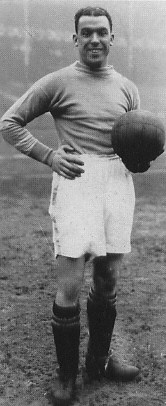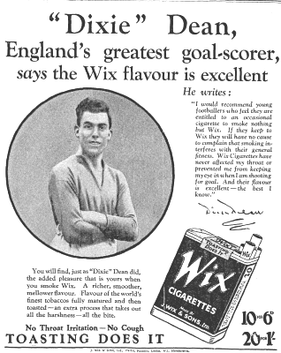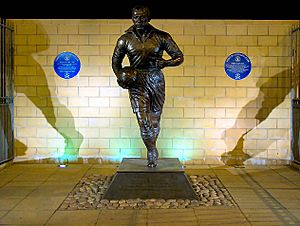Dixie Dean facts for kids

Dean at Goodison Park while playing for Everton
|
|||
| Personal information | |||
|---|---|---|---|
| Full name | William Ralph Dean | ||
| Date of birth | 22 January 1907 | ||
| Place of birth | Birkenhead, Cheshire, England | ||
| Date of death | 1 March 1980 (aged 73) | ||
| Place of death | Goodison Park, Liverpool, England | ||
| Height | 5 ft 10 in (1.78 m) | ||
| Position(s) | Centre forward | ||
| Senior career* | |||
| Years | Team | Apps | (Gls) |
| 1923–1925 | Tranmere Rovers | 30 | (27) |
| 1925–1937 | Everton | 399 | (349) |
| 1938–1939 | Notts County | 9 | (3) |
| 1939 | Sligo Rovers | 7 | (10) |
| 1940 | Hurst | 2 | (1) |
| Total | 447 | (390) | |
| International career | |||
| 1927–1932 | England | 16 | (18) |
| *Club domestic league appearances and goals | |||
William Ralph "Dixie" Dean (born January 22, 1907 – died March 1, 1980) was a famous English footballer. He played as a centre forward, which is a player whose main job is to score goals. Many people think he was one of the best centre-forwards ever. He was even put into the English Football Hall of Fame in 2002.
Dixie Dean was born in Birkenhead, England. He started his football journey at his local club, Tranmere Rovers. Later, he moved to Everton, the team he loved since he was a child. He was amazing at scoring goals, especially with his head! He could jump very high and hit the ball with great power and accuracy. This made him one of the best "aerial specialists" in football history.
He played most of his career at Everton. After some injuries, he moved to Notts County and then to Sligo Rovers. Dixie Dean is most famous for his incredible 1927–28 season. In that year, he scored a record-breaking 60 league goals! He also scored 18 goals in 16 games for the England national team.
A statue of Dixie Dean was put up outside Goodison Park, Everton's stadium, in May 2001. A year later, he was one of the first 22 players to join the English Football Hall of Fame. In the 1933 FA Cup Final, Dean was the first footballer ever to wear the number 9 shirt.
Contents
Growing Up and Starting Football
Dixie Dean was born in Birkenhead, a town near Liverpool. His family loved football, and his dad, William Sr., took him to an Everton match when he was young. Everton won the league title that year, and Dixie became a big fan.
His childhood happened during the First World War. When he was 7 to 11 years old, he helped out by delivering milk to families. He would wake up very early to get the ponies and milk floats. He said it was hard work, but everyone helped during wartime.
Dixie went to Laird Street School. He felt that his main lesson was football! He would help out by giving out pens and chalks. When he was 11, he went to Albert (Memorial) Industrial School in Birkenhead. He chose this school because it had great football facilities. Dixie loved playing on the school's football team.
He left school at 14 and started working as an apprentice fitter for Wirral Railway, just like his dad. Dixie took a night job so he could focus on playing football during the day.
The sons of his manager at Wirral Railway were interested in signing him for New Brighton A.F.C.. But Dixie wasn't interested. Instead, he played for a local team called Pensby United. It was there that a scout from Tranmere Rovers noticed his amazing talent.
How He Got His "Dixie" Nickname
Some people say that Dixie Dean and his family didn't really like his nickname. They preferred to call him "Bill" or "Billy." A popular story is that he got the nickname when he was young because of his dark hair and skin. He might have looked a bit like people from the Southern United States, which was sometimes called "Dixie."
Another idea comes from a historian who found out that "Dixie" might have come from his childhood nickname, "Digsy." This was because when he played tag, he would "dig" his fist into a friend's back.
Playing for Clubs
Tranmere Rovers
Dixie Dean played for several local teams before joining his hometown club, Tranmere Rovers, in November 1923. He was only 16 years old then.
In just 16 months at Tranmere, he scored 27 goals in 30 league games. All of those goals came in his second season, where he scored exactly one goal per game! Many big clubs, like Arsenal and Newcastle United, wanted to sign him.
Everton
It was a dream come true for Dixie when he signed for Everton in March 1925, just after turning 18. He had been an Everton fan since he was a little boy. He ran the 2.5 miles from his home to meet the Everton secretary!
Everton paid £3,000 for him, which was a record fee for Tranmere Rovers at the time. Dixie made a huge impact right away, scoring 32 goals in his first full season.
In the summer of 1926, Dixie had a serious motorcycle accident. He fractured his skull and jaw, and doctors weren't sure if he would ever play football again. But he did! In his very next game for Everton, he scored a goal with his head. Everton fans joked that the doctor must have left a metal plate in his head!
Dixie Dean is most famous for being the only player in English football to score 60 league goals in one season. This happened in the 1927–28 season, when he was only 21 years old.
In that same 1927-28 season, Everton won the First Division title. When the club was relegated to the Second Division in 1930, Dixie stayed with them. They immediately won the Second Division in 1931. Then, they won the First Division again in 1932. After that, they won the FA Cup in 1933. This amazing winning streak has not been matched since!
Dixie was the captain of the team later in his career. But the tough physical demands of the game eventually took their toll. He was dropped from the first team in 1937.
Notts County
After Everton, Dixie Dean played for Notts County for one season. He scored three goals in nine games for them.
Sligo Rovers
When he was 32, Dixie signed for the Irish team Sligo Rovers in January 1939. He helped the club in their FAI Cup competition. When he arrived in Sligo, the train station was full of local fans excited to see him!
Dixie scored ten goals in just seven games for Sligo Rovers. This included five goals in one game against Waterford, which is still a club record! He also played in four Cup matches. His runner-up medal from the FAI Cup final was stolen from his hotel room. But 39 years later, when he returned to Ireland to watch Rovers play, the medal was delivered back to his hotel room! He is still seen as a legend at Sligo Rovers.
Hurst
Dixie Dean finished his professional playing career with Hurst (now called Ashton United) in the 1939–40 season. He played two games and scored one goal before the start of the war ended his career.
Playing for England
Dixie Dean played his first game for the England national football team in February 1927. He was just under 20 years old. His last game for England was in October 1932, when he was 25.
He played in the British Home Championship in 1927 and 1929. In 1927, he scored four goals in two games for England, including two against Scotland. Even though England lost that game, the Scottish fans applauded Dixie! In total, Dixie Dean played 16 times for England and scored 18 goals. This included three goals in one game (a "hat-trick") against Belgium and Luxembourg.
Life After Football
After he stopped playing football, Dixie Dean became a Freemason in 1931. He also ran a pub called the Dublin Packet in Chester. Later, he worked as a porter for Littlewoods, a company known for its football pools. People who worked with him remembered him as a quiet and humble man.
Later Life and Passing Away
In January 1972, Dixie Dean was in the hospital because of the flu. In November 1976, he had to have his right leg amputated due to a blood clot. His health was getting worse, and he stayed home more often.
Dixie Dean passed away on March 1, 1980, at the age of 73. He had a heart attack while watching a football match at Everton's home ground, Goodison Park. It was a game against their biggest rivals, Liverpool. It was the first time he had been to Goodison Park in several years because of his health. The famous football manager Bill Shankly said, "He belongs to the company of the supremely great, like Beethoven, Shakespeare and Rembrandt".
His funeral was held at St James' Church in Birkenhead, on the same street where he was born. He had four children: William, Geoffrey, Ralph, and Barbara. His wife, Ethel, had passed away in 1974.
His Legacy
Dixie Dean was known all over the world. Many people admired him.
Everton held a special match for Dixie Dean on April 7, 1964. Over 34,000 people came to watch teams made up of players from Scotland and England (including players from Everton and Liverpool). The match raised £7,000 for Dixie.
In March 2001, Dixie Dean's 1933 FA Cup winners medal was sold at an auction for over £18,000. In May 2001, a statue of Dixie Dean was put up outside Goodison Park. It cost £75,000 and has the words "Footballer, Gentleman, Evertonian" written on it. In 2002, Dixie was one of the first people to be inducted into the English Football Hall of Fame. There is also an annual "Dixie Dean award" given to the best player in Merseyside.
When asked if he thought his record of scoring 60 goals in a season would ever be broken, Dixie Dean famously said: "People ask me if that 60-goal record will ever be beaten. I think it will. But there's only one man who'll do it. That's the fellow that walks on the water. I think he's about the only one."
In total, Dixie Dean scored an amazing 383 goals for Everton in 433 games. He scored 37 "hat-tricks" (three goals in one game)! He was also known as a very fair player. He was never booked or sent off during his entire career, even though opponents often played roughly against him.
In December 1930 and again in October 1931, Dixie Dean was the first Everton player to score two hat-tricks in one month. This record stood for almost 90 years!
Awards and Achievements
Everton
- Football League First Division: 1927–28, 1931–32
- Second Division Championship: 1930–31
- FA Charity Shield: 1928, 1932
- FA Cup: 1932–33
Sligo Rovers
- League of Ireland runners-up 1938–39
- FAI Cup runners-up: 1938–39
England
- British Home Championship: 1926–27 (shared), 1931–32 (shared)
Individual Awards
- England Caps: 16
- England Goals: 18
- Sunday Pictorial Trophy (for 60 league goals in 1927–28)
- Lewis's Medal (to celebrate 200 league goals in 199 games)
- Hall of Fame Trophy (1971)
- Football Writers' Association inscribed silver salver (1976)
- English Football Hall of Fame (one of the first players inducted, 2002)
- Most goals in an English top-flight season: 60 (1927–28)
- Seasonwise World Top Scorer: 1927–28 (60 goals)
Career Statistics
Club
| Club | Season | League | FA Cup | Charity Shield | Total | |||||
|---|---|---|---|---|---|---|---|---|---|---|
| Division | Apps | Goals | Apps | Goals | Apps | Goals | Apps | Goals | ||
| Tranmere Rovers | 1923–24 | Third Division | 3 | 0 | 0 | 0 | 0 | 0 | 3 | 0 |
| 1924–25 | Third Division | 27 | 27 | 3 | 0 | 0 | 0 | 30 | 27 | |
| Total | 30 | 27 | 3 | 0 | 0 | 0 | 33 | 27 | ||
| Everton | 1924–25 | First Division | 7 | 2 | 0 | 0 | 0 | 0 | 7 | 2 |
| 1925–26 | First Division | 38 | 32 | 2 | 1 | 0 | 0 | 40 | 33 | |
| 1926–27 | First Division | 27 | 21 | 4 | 3 | 0 | 0 | 31 | 24 | |
| 1927–28 | First Division | 39 | 60 | 2 | 3 | 1 | 2 | 42 | 65 | |
| 1928–29 | First Division | 29 | 26 | 1 | 0 | 0 | 0 | 30 | 26 | |
| 1929–30 | First Division | 25 | 23 | 2 | 2 | 0 | 0 | 27 | 25 | |
| 1930–31 | Second Division | 37 | 39 | 5 | 9 | 0 | 0 | 42 | 48 | |
| 1931–32 | First Division | 38 | 45 | 1 | 1 | 0 | 0 | 39 | 46 | |
| 1932–33 | First Division | 39 | 24 | 6 | 5 | 1 | 4 | 46 | 33 | |
| 1933–34 | First Division | 12 | 9 | 0 | 0 | 0 | 0 | 12 | 9 | |
| 1934–35 | First Division | 38 | 26 | 5 | 1 | 0 | 0 | 43 | 27 | |
| 1935–36 | First Division | 29 | 17 | 0 | 0 | 0 | 0 | 29 | 17 | |
| 1936–37 | First Division | 36 | 24 | 4 | 3 | 0 | 0 | 40 | 27 | |
| 1937–38 | First Division | 5 | 1 | 0 | 0 | 0 | 0 | 5 | 1 | |
| Total | 399 | 349 | 32 | 28 | 2 | 6 | 433 | 383 | ||
| Notts County | 1937–38 | Third Division | 3 | 0 | 0 | 0 | 0 | 0 | 3 | 0 |
| 1938–39 | Third Division | 6 | 3 | 0 | 0 | 0 | 0 | 6 | 3 | |
| Total | 9 | 3 | 0 | 0 | 0 | 0 | 9 | 3 | ||
| Sligo Rovers | 1938–39 | League of Ireland | 7 | 10 | 4 | 1 | 0 | 0 | 11 | 11 |
| Total | 7 | 10 | 4 | 1 | 0 | 0 | 11 | 11 | ||
| Hurst | 1939–40 | Cheshire County League | 2 | 1 | 0 | 0 | 0 | 0 | 2 | 1 |
| Total | 2 | 1 | 0 | 0 | 0 | 0 | 2 | 1 | ||
| Career total | 447 | 390 | 39 | 29 | 2 | 6 | 488 | 425 | ||
International Goals
- Scores and results list England's goal tally first, score column indicates score after each Dean goal.
| No. | Date | Venue | Opponent | Score | Result | Competition | Ref. |
|---|---|---|---|---|---|---|---|
| 1 | 12 February 1927 | Racecourse Ground, Wrexham, Wales | 1–0 | 3–3 | 1926–27 Home Championship | ||
| 2 | 3–3 | ||||||
| 3 | 2 April 1927 | Hampden Park, Glasgow, Scotland | 1–1 | 2–1 | |||
| 4 | 2–1 | ||||||
| 5 | 11 May 1927 | Molenbeek, Belgium | 5–0 | 9–1 | International Friendly | ||
| 6 | 6–0 | ||||||
| 7 | 9–0 | ||||||
| 8 | 21 May 1927 | Stade de la Frontière, Esch-sur-Alzette, Luxembourg | 1–2 | 5–2 | |||
| 9 | 3–2 | ||||||
| 10 | 4–2 | ||||||
| 11 | 26 May 1927 | Stade Olympique Yves-du-Manoir, Colombes, France | 2–0 | 6–0 | |||
| 12 | 5–0 | ||||||
| 13 | 17 May 1928 | Stade Olympique Yves-du-Manoir, Colombes, France | 3–1 | 5–1 | |||
| 14 | 4–1 | ||||||
| 15 | 19 May 1928 | Olympisch Stadion, Antwerp, Belgium | 1–1 | 3–1 | |||
| 16 | 2–1 | ||||||
| 17 | 22 October 1928 | Goodison Park, Liverpool, England | 2–1 | 2–1 | 1928–29 Home Championship | ||
| 18 | 9 December 1931 | Arsenal Stadium, London, England | 5–0 | 7–1 | International Friendly |
See also
 In Spanish: Dixie Dean para niños
In Spanish: Dixie Dean para niños
- List of English football first tier top scorers
- List of men's footballers with 500 or more goals
 | Laphonza Butler |
 | Daisy Bates |
 | Elizabeth Piper Ensley |



